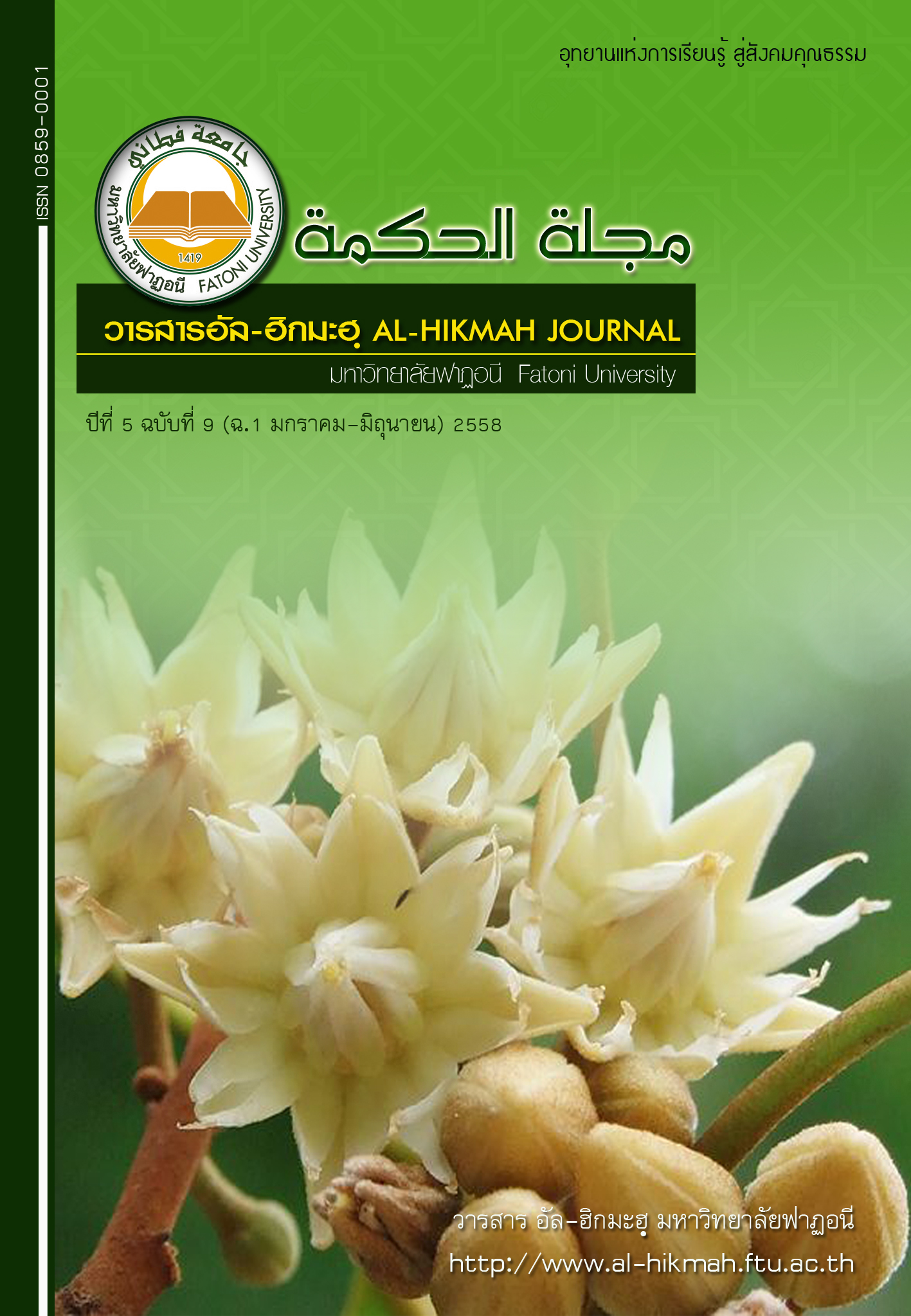ศึกษาวิเคราะห์คุณลักษณะผู้นำของนบียูซุฟ () ผ่านซูเราะฮยูซุฟ
คำสำคัญ:
ซูเราะห์ยูซุฟ, วิเคราะห์คุณลักษณะผู้นำบทคัดย่อ
บทความนี้มาจากการศึกษาเอกสารที่ได้ศึกษาวิเคราะห์เรื่องราวของนบียูซุฟ (u) อันเป็นเรื่องที่มีรายละเอียดและมีความน่าสนใจมากที่สุดเรื่องหนึ่งที่ถูกประทานลงมาในซูเราะฮยูซุฟ ซึ่งเป็นซูเราะฮที่ 12 ของคัมภีร์อัลกุรอาน เรื่องราวดังกล่าวประกอบด้วยเรื่องเกี่ยวกับความอ่อนแอของมนุษย์ อันได้แก่ ความอิจฉาริษยา ความโกรธแค้น ความเย่อหยิ่ง กิเลศตัณหา เล่ห์เพทุบาย ในทางตรงกันข้ามก็มีเรื่องราวที่ดีๆ เช่น เรื่องของความอดทน ความซื่อสัตย์ ความกล้าหาญ ความเป็นผู้ดี และความเห็นอกเห็นใจ
การศึกษาครั้งนี้มีวัตถุประสงค์เพื่อ 1.วิเคราะห์คำถามบางประการ เช่น ทำไม่นบียูซุฟ(u)ถึงมั่นใจที่จะเสนอตนเองเป็นผู้จัดการดูแลดินแดนอียิปต์ที่กำลังจะเผชิญกับความแห้งแล้งที่ยากแค้น ทำไมนบียูซุฟ(u)จึงยกย่องตัวเอง ทำไมนบียูซุฟ(u)จึงยอมร่วมงานกับรัฐที่ไม่ได้ศรัทธาต่ออัลลอฮ สิ่งนี้ไม่เป็นที่ยอมรับในอิสลามใช่ไหม ทำไมกษัตริย์จึงมีความมั่นใจอย่างแรงกล้าว่านบียูซุฟ(u)จะสามารถปฏิบัติงานอย่างมีประสิทธิภาพในตำแหน่งผู้บริหาร นบียูซุฟ(u)เป็นผู้นำหรือผู้บริหารโดยกำเนิดใช่ไหม 2.เพื่อศึกษาคุณลักษณะในการบริหารของนบียูซุฟ(u) ผลการวิจัยพบว่านบียูซุฟ(u)เป็นผู้บริหารที่มีลักษณะเฉพาะและมีลักษณะที่โดดเด่น นอกจากนั้นยังพบว่านบียูซุฟ(u)เป็นผู้ที่มีความสามารถและมีคุณสมบัติของความเป็นผู้นำสูง
เอกสารอ้างอิง
Abul A’la Maududi. 1983. The Meaning of Quran. Lahore: Qudduri Printer.
Ahamad Ibrahim Abusin. 1991. Pengurusan dalam Islam. Selangor: Dewan Bahasa dan Pustaka.
Amili, Muhammad bin Hasan al-Hurr trans. 1391 A.H al-, Wasa'ilu sh-Shi'ah. vol.12. Beirut: Dar Ihya'i't-Turathi 'l-'Arabi.
Fathi Yakan. 1984a. Islamic movement problems and perspective. America: American Trust Publication.
Fathi Yakan. 1984b . Problems faced by the Da’wah and the Da’iyah. Delhi: International Printing Press.
Hamka. 1987. Tafsir al Azhar. Singapore: Kerjaya Printing Industries Ple. Ltd.
Louay Fatoohi. 2005. The prophet Joseph in the Quran, the Bible and History. Kuala Lumpur: Islamic Book Trust.
Mohd. Abdul Rauf. 1987. Management and administration from Islamic perspective. Islamic Affairs Division, prime Minister Department.
Mohd. Sharif Khan and Mohd. Saleem Khan. 1980. Educational administration. New Delhi: Ashish Publishing House.
Muhammad Rashid Rida trans. 1990. Tafsir Nurl –Ul-Thaqalayn. vol.2 & vol.5. Cairo: Maktabatal-Qahira.
Mustafa Sibai. 1987. Al-Sirah al-Nabawiay. IIFSO.
Sahih Muslim.1984. vol. 4. New Delhi: Lohti Fine Art Press.
Tabarsi, Shaykh Abu Ali al‐Fadl trans. 1981 al‐, Tafsir Majma' al Bayan (Persian). Tehran: Intesharat‐e Far



